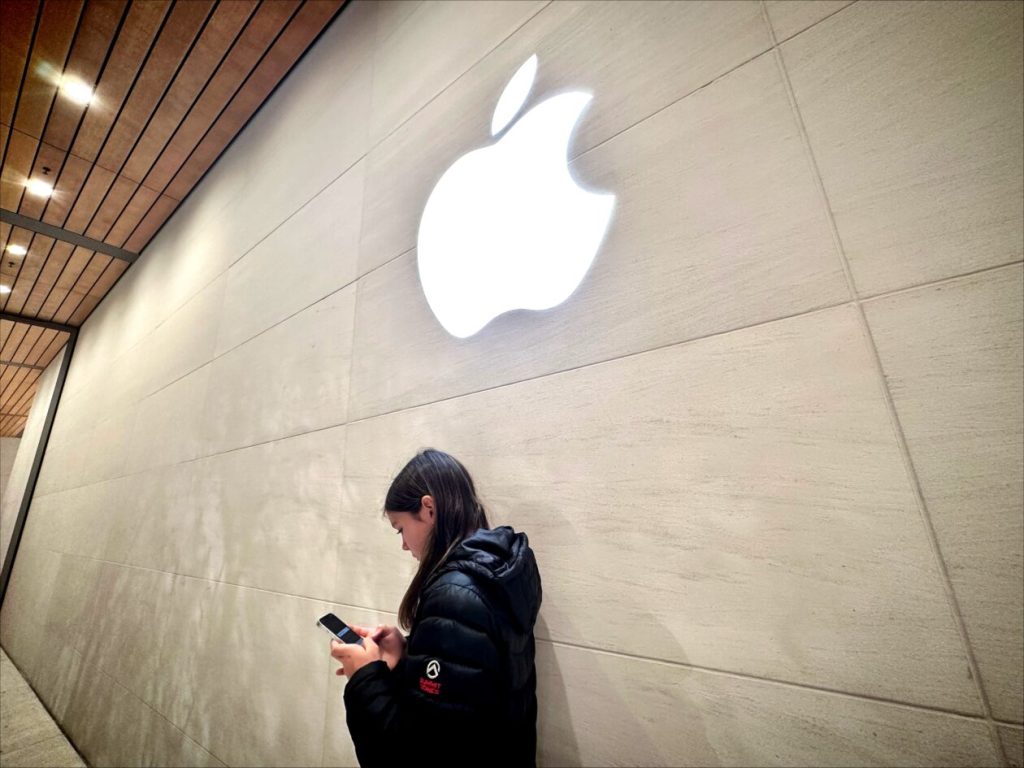Summarize this content to 2000 words in 6 paragraphs
Getting the hang of a new iPhone at the Apple Store in Seattle’s University Village. (GeekWire Photo / Kurt Schlosser)
Quick, take a picture of me — you’re looking at the hero of Christmas! Better yet, let’s have my 6th-grade daughter take it with the new iPhone we got her.
Actually, I don’t feel like much of a hero. I kind of feel like a sellout who caved to the pressure of convenience and consumerism in the digital age. I feel like a dad who just said goodbye to his little girl.
Just three months ago I was writing about how I wanted to put off buying my 11-year-old, Kate, her own phone, possibly until she was done with middle school. We didn’t even make it to mid-winter break of her first year.
It’s a strange time to be a parent. Schools everywhere, including in Seattle, are cracking down on the use of phones by students. And even Bill Gates can be spooked by the reality of ever-present technology, as is evident in his review of Jonathan Haidt’s “The Anxious Generation.”
In some ways, I blame Kate for being responsible and independent enough to warrant earning her new device. I got tired of being unable to reach her when she, or her mom and I, were away from the house. It felt odd getting texts from her friends telling me Kate’s Apple Watch wasn’t working.
While I cherish the gone-all-day-with-no-contact 1970s and ’80s that I grew up in, times have certainly changed. If Kate heads out on a walk or bike ride with friends, I want to know she made it to where she was headed. Modern tech gives me that ability, and better communication became my breaking point.
Now I’m the throes of watching my decision play out, and bracing for an end of innocence sped up by the internet. Kate was already getting gripped by the addictive habits of screen time and texting thanks to her own iPad. The phone gives that addiction better portability and increased mobility. And in the short time since Christmas, Kate is modeling some of the immersive phone behavior she learned over the years from her parents and brother.
“I have yet to meet a parent who doesn’t feel a mix of many feelings when their child gets their first smartphone. Worried and sad are common emotions,” said Delaney Ruston, a longtime Seattle-based documentary filmmaker behind the “Screenagers” titles and a nationally recognized physician who specializes in mental health and the effects of screen time on young people.
Ruston previously stressed to me how important it was to maintain an open family dialogue about screen time and what’s appropriate behavior and content consumption on a smartphone for an 11-year-old. Kate is already mentioning text threads and group chats and I want to stay on top of monitoring her usage as well as I can.
“Your job as parents is to work with her to have clear times when the phone is truly away so her brain won’t get continually pulled,” Ruston said. “This is an attention economy, in which many forces are at work to keep your attention on screens. All that time online takes away from using your incredible and unique brain to create your own thoughts, creations, in-person friendships, family relationships, and on and on.”
Pictures by a new iPhone owner. (GeekWire Photos)
Ruston also said it’s important to let Kate know that there will be phone-based interactions with friends that go awry, or there will be media that gets posted on a group text that makes her uncomfortable. As parents, we need to let her know she can come to us to talk about what feels right or wrong.
“It is not about punishing her or taking away her phone privileges,” Ruston said.
So far, beyond the texting and FaceTiming with friends, Kate appears to be playing the same silly video games she played on her iPad. There will be no social media apps — hopefully for a long time. During a drive to go snowboarding, I watched her take pictures out the car window of the mountains and snowy trees — I liked that, because my own phone is a camera more than anything.
Before bedtime Kate’s been putting the phone on the kitchen counter, adhering to a no-phone-in-the-bedroom policy we set. When it comes to school, she promises the phone will stay in her backpack, or go in a cubby that some teachers use to contain the distraction.
Overall, it’s a combination of learning and trust right now. And while it’s nice to text her and get an immediate reply, or to have her laugh at a picture I send of the cat, it still feels strange.
I feel like I made the call for her to grow up faster than I’d hoped.


